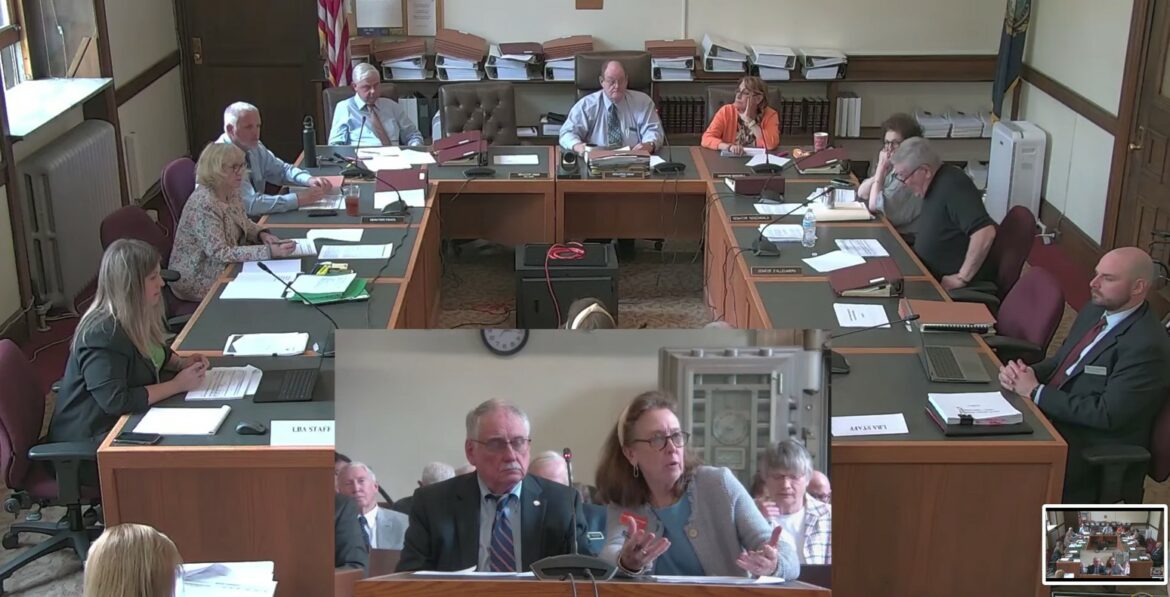By GARRY RAYNO, InDepthNH.org
CONCORD — The Senate Finance Committee hopes to finish 99 percent of its work by the end of the week but has many outstanding issues to navigate before a final vote.
The committee Tuesday agreed to increase state funding for housing initiatives, but voted down a plan to allocate money to reduce what cities and towns would have to pay for its employees in the state retirement system, and decided against contributing to public television, something the state once did but ended the practice over a decade ago.
Facing a crisis in the state, the finance committee decided to fund housing initiatives at $45 million or equal to what the House proposed in its budget, but with a different distribution of the money.
Under the plan $20 million would be allocated for affordable housing, $10 million for the Invest program, $10 million for homeless programs and $5 million for a new initiative.
The Republican majority of the committee declined to add $5 million to the new initiative as proposed by Sen. Cindy Rosenwald, D-Nashua.
The committee also decided to use $5 million of the affordable housing money for tax credits to encourage investment in historic buildings.
Retirement Costs
Last fiscal year the state used $28 million to reduce state retirement system costs for cities and towns, which includes school district and county employees.
The House budget appropriated $50 million from the projected revenue surplus for the current fiscal year, 2023, which ends June 30, to make a one-time payment to reduce the system’s unfunded liability instead of offsetting public employee premium costs for local governments.
The committee had three proposals for the retirement system costs before it Tuesday, and committee chair Sen. James Gray, R-Rochester, said what will ultimately be decided will not look like any of those three proposed amendments.
But Rosenwald wanted to move forward on the one similar to what was done this fiscal year and noted that it required cities and towns to use the money to reduce property taxes.
“Nothing else we have in the budget directly reduces property taxes,” she said. “When we give more money to the cities and towns there is no guarantee it will be used to reduce property taxes.”
The amendment she is proposing, Rosenwald said, directs the money be used to provide property tax relief as it did with this biennium’s payments.
Sen. Lou D’Allesandro, D-Manchester, agreed saying the boom in the real estate market raised the value of property so property taxes are going up, and passing the amendment would help property owners with their tax bills.
But Senate President Jeb Bradley, R-Wolfeboro, disagreed that there is nothing else in the budget to provide property tax relief, noting Friday the committee will discuss a new education funding formula that will increase the allocation by $79 million in fiscal 2024 and $85 million in fiscal 2025.
“Every time we increase education funding,” he said, “there is property tax relief.”
He also noted an increase in funding programs like the ones for road and bridge work would also produce property tax relief.
“We have spent a lot of time all winter long on our priorities like provider rates, (and we will provide) $120 million and maybe a little more, and more money for mental health services, a top, top priority,” Bradley said, noting the state employee pay raise and child care services are other priorities.
“This committee has done a really good job of living within its means,” he said, “(while addressing) top priorities.”
Rosenwald said there is nothing that requires that property taxes be reduced as her amendment would do.
But she noted, the committee decided to cut about $80 million in general funds from the Medicaid program, while revenues are $164 million more than the House had.
“We can afford to give cities and towns some property tax relief that is guaranteed,” she said, but the amendment was voted down on a 4-2 vote.
One of the other proposed changes to the retirement system was the subject of a press conference Tuesday morning with public safety workers and officials who want the Senate to include in its budget what the House approved.
The change affects about 1,800 state law enforcement and fire fighting personnel, or Group II members, who were members of the retirement system but not vested when benefit parameters were changed in 2011.
The House included $50 million to cover the cost of returning the benefit’s eligibility requirements to what they were before the change was made in 2011.
Gov. Chris Sununu also does not favor changing the retirement system.
Public Television
Rosenwald and D’Allesandro have pushed to once again provide some state money to New Hampshire Public Television saying local programing is very sparse and the additional money would help provide some new ones.
Peter Frid, president and CEO of the station, said in 2011, the station lost $2.7 million in state funding, and had to lay off 40 percent of its staff and curtail all local programming.
He said the station has been able to bring back some programming, but not the amount it would like to provide.
“We could use the $500,000 to add some local programs . . . that would extend into the internet.” Frid said, “that could really create some value for the citizens of the state.”
The station could also add educational material, he noted, saying the station is working on a workforce development project that could be used to help people who want to move to the state.
But Rosenwald and D’Allesandro were on the losing end of a 4-2 vote.
The Senate Finance Committee meets again Thursday at 1 p.m.
Garry Rayno may be reached at garry.rayno@yahoo.com.






